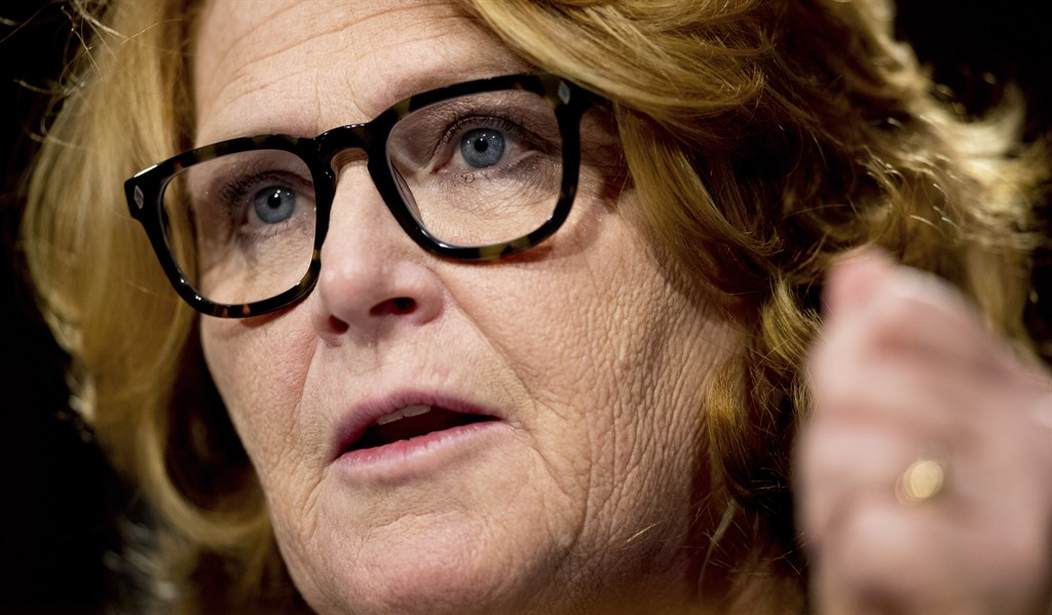Will voters in red states like Missouri and Montana reward their Senate incumbents in 2018 for attempts at obstructing Donald Trump’s Supreme Court nominees, and punish those who did not? Clearly that’s what progressive groups think, and convinced Senate Minority Leader Chuck Schumer to pursue all-out obstruction on Neil Gorsuch, but Heidi Heitkamp begs to differ. She cast votes against the filibuster and for confirming Gorsuch on his merits rather follow the partisan warfare of her caucus, and tells CNBC’s Squawk Box today that it was the correct decision:
Democratic Sen. Heidi Heitkamp told CNBC on Tuesday she supported Neil Gorsuch’s nomination to the Supreme Court based on an interview and a review of his record.
“Would he be the judge I’d pick? No, never,” the North Dakota senator said on “Squawk Box.” “But he is the judge that the duly elected president picked.”
That certainly will put a dent in the current Democratic narrative that Gorsuch was too radical to allow past a filibuster. Heitkamp seems unconcerned about maintaining that fantasy, and also about potential blowback from the voters in her state. She claims that they have gone out of their way to thank her for her discretion, having tired of partisan warfare in Washington:
“Elections have consequences,” she said. “This was someone who was qualified. You may not agree with all of his decisions.”
“There’s a lot of people disappointed and there is a lot of people who walk by in the coffee shop and say thanks for your vote. They’re tired of partisanship,” she said.
If nothing else can be gleaned from the 2016 cycle, this should be obvious to everyone except the extremists with something to sell. More than anything else in my research for Going Red, the exhaustion of hyperpartisanship in Washington DC was a common theme in all seven swing counties I researched. Voters told me over and over again that they wanted a government that worked at the tasks it was supposed to accomplish and stay out of what it wasn’t. Republicans, Democrats, and independents insisted that they were much more concerned about solving problems than in fighting ideological battles to constant stalemates in the Beltway — a pretty apt description of what happened with Gorsuch.
Unfortunately, that message isn’t getting through to the Democratic Party leadership. In Virginia, Salena Zito reports on an astounding snub of famed Democratic organizer Mudcat Saunders, who was trying to reconnect Democrats to the rural voters they’d lost over the last decade:
Saunders is the Democrats’ outspoken liaison between progressive candidates and rural voters to help them soften their message to longtime Democratic voters who still like God, guns and find themselves in a church pew every Sunday. He was unceremoniously uninvited to the very event that was supposed to bring rural and progressive Democrats together ahead of the governor’s race this year.
“Like I said, not exactly the way I would have approached it. I think every voice needs to be heard, we are losing rural Democrat support and I think we really need that for this governor’s race in order to win,” he said.
In short Democrats believe that because of their populous numbers in the urban suburbs in Northern Virginia they don’t need rural voters, nor are they showing any willingness to petition, engage or win them over.
Perhaps this might be true in the short term. The rapid growth of NoVA and its transformation of Virginia into a blue state was a topic in Going Red too. I argued that Republicans had to learn to contextualize their national agenda for a region where federal government drives the economy, and learn to apply it to local issues. But Democrats have the same problem in reverse, and where Republicans at least tried to organize to improve their communications, Democrats have instead doubled down on their rejection of large groups of voters.
Heitkamp’s gamble may not pay off for her, given just how red North Dakota is and the likelihood of a strong Republican challenge next year. But other red-state Democrats with largely rural constituencies will also likely find 2018 to be a difficult cycle after signing up for the same hyperpartisan, establishmentarian, and elitist politics that lost Democrats the White House and control of the Senate last November. Elections have consequences — and ignoring them has even greater consequences.







Join the conversation as a VIP Member